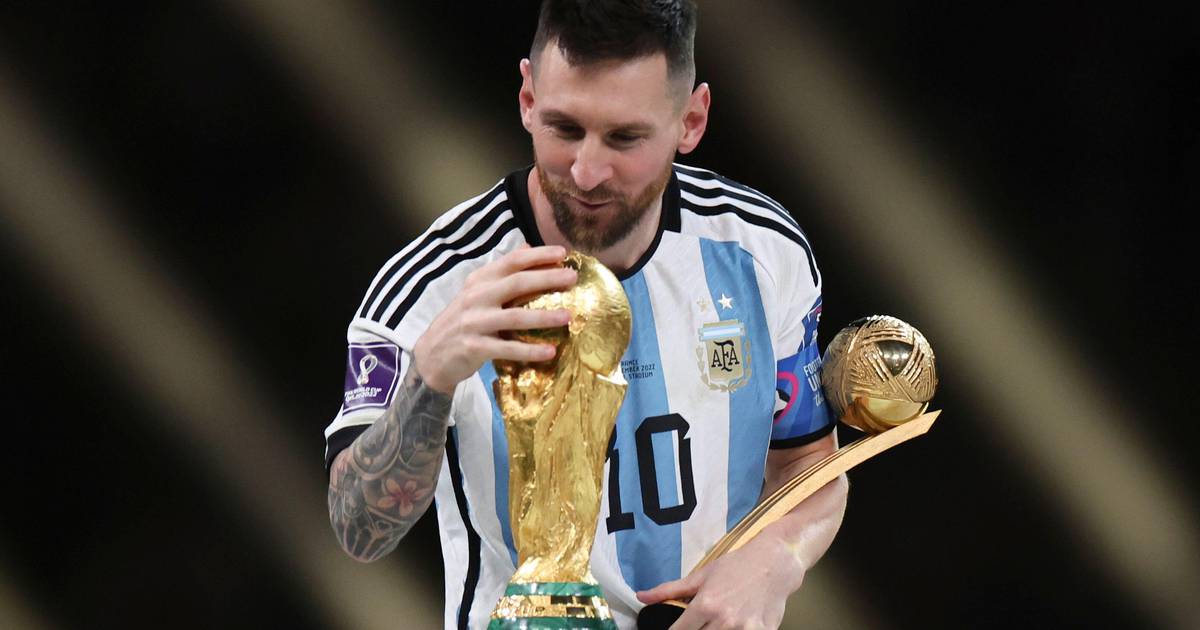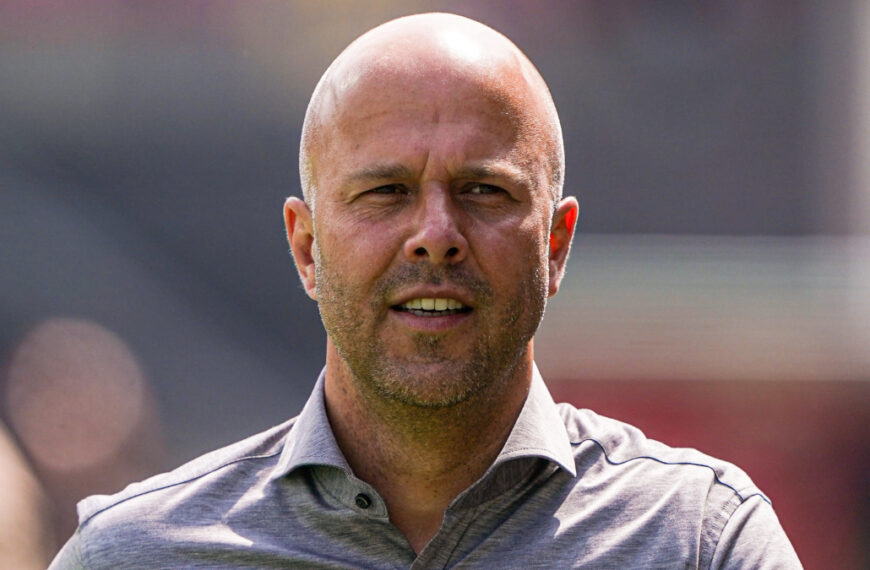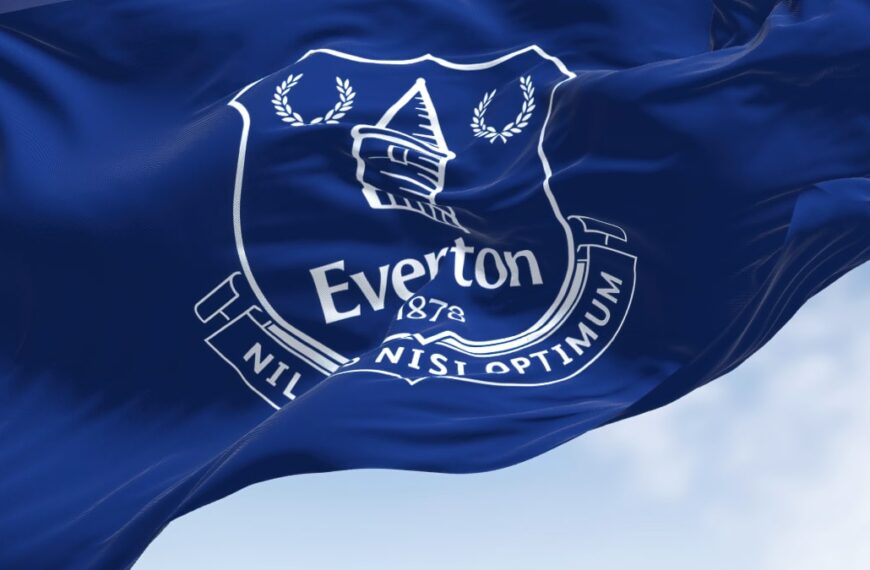The 22nd edition of the World Cup saw 64 matches take place, with 172 goals scored, with Argentina lifting the trophy for the third time on Sunday night.
It was a tournament of off-field controversies, on-pitch shocks, underdog stories and magical moments from the world’s biggest superstars.
This article recounts the best moments of the last four weeks in Qatar, compiling the 101 best facts and stats about World Cup 2022.
📰 Table Of Contents
A tournament of upsets

Saudi Arabia’s Salem Al-Dawsari celebrates scoring their side’s second goal of the game during the FIFA World Cup Group C match at Lusail Stadium, Lusail, Qatar. Picture date: Tuesday November 22, 2022. (Alamy Stock Photo)
One of the most iconic World Cup games ever happened right at the start of the tournament, with Saudi Arabia defeating eventual champions Argentina 2-1.
This is the first time la Albiceleste have lost a World Cup game when going 1-0 up since 1958 (vs West Germany), while they last lost when leading at half time in 1930, beaten in that year’s final by Uruguay. Furthermore, according to Gracenote Live, this is statistically the biggest upset in World Cup history, surpassing USA’s win over England in 1950.
The majority of the other group stage madness was to be found in Group E, specifically in Japan games. First, the Samurai Blue beat Germany, with die Mannschaft losing a World Cup game in which they led at half time for the first time in 44 years.
Also, only twice in World Cup history has a team attempted 700+ passes and lost, these being Germany vs Japan on 23 November and Germany vs Japan eight days later.

23rd November 2022; Khalifa International Stadium, Al Rayyan, Qatar; FIFA World Cup Football, Germany versus Japan; Ilkay Gundogan of Germany holds his head as his shot misses the goal (Alamy Stock Photo)
It’s said that, at every tournament, one giant crashes out in the group stages and, as was the case in 2018, this fate was bestowed upon Germany. Despite exiting, Hansi Flick’s team created the highest xG of any team in the group stage, with their xG figure of 3.53 (vs Japan) the highest losing figure in history.
Jamal Musiala had 24 touches in the opposition penalty area vs Costa Rica, a new record, while that game ended Germany’s 11-match sequence of conceding first at major tournaments. In the end, Japan topped Group E with Germany going home, making it ironic that all three of Japan’s group stage scorers ply their trade in the Bundesliga.
This will be the last men’s World Cup to feature 32 teams, making it intriguing that no side won all three group games for the first time since USA ‘94, the last tournament before expansion to 32.
African teams exceeding expectations

Doha, Qatar. 10th Dec, 2022. Soccer, World Cup, Morocco – Portugal, final round, quarterfinals, Al-Thumama Stadium, Morocco’s Youssef En-Nesyri scores against Portugal’s Matheus Nunes and Portugal’s Ruben Dias to make it 1-0. Credit: Tom Weller/dpa/Alamy (Alamy Stock Photo)
This was Africa’s most-successful World Cup of all-time, with CAF’s five representatives recording nine wins, smashing the previous record of four from 2010. This is significant because all five were led by African managers for the first time, with all five actually in charge of their native countries.
AFCON winners Senegal reached the round of 16 by defeating Ecuador, the first time an African side had beaten a South American team for 32 years, ending a 21-match sequence.
Three days later, Cameroon became the first African side ever to beat Brazil at a World Cup, while Tunisia’s win against France was their first World Cup victory against a side from outside the CONCACAF region.
Ghana too enjoyed their moments, beating Korea Republic 3-2, having lost their opener against Portugal by the same scoreline. This made the Black Stars just the fourth team to record back-to-back 3-2s, after Uruguay (2010), Germany (1994) and Switzerland (1934).
But all the plaudits should be reserved for Morocco, who became Africa’s first-ever World Cup semi-finalists, elimintating Belgium, Spain and Portugal en route. The Atlas Lions accumulated seven points in the group phase, an African record, while Yassine Bounou is the first African goalkeeper to keep 3+ clean sheets at a single edition. In fact, Morocco became just the sixth team (since 1986) to reach the semi-finals conceding one goal or less.
From 2026 onwards, CAF could have ten teams featuring at the World Cup (9 guaranteed), with this tournament fully justifying this large increase.
An historic tournament for Asia too

Doha, Qatar. 1st Dec, 2022. Tanaka Ao of Japan (R) of Japan celebrates after scoring team’s second goal during the Group E match between Japan and Spain at the 2022 FIFA World Cup at Khalifa International Stadium in Doha, Qatar, Dec. 1, 2022. Credit: Meng (Alamy Stock Photo)
Given that this was just the second time the World Cup had been staged in Asia, and first in an Arabic country, it was always going to be an historic tournament for the continent.
On the field, AFC’s members all produced, apart from current Asian champions Qatar who, to put it politely, did not. The Maroons became the first hosts to: 1) suffer defeat in their opening game. 2) lose all three games. 3) finish bottom of their group. Qatar had 4,371 days to prepare for this competition, but were eliminated by day six.
Their neighbours Saudi Arabia though historically beat Argentina, with Salem Al-Dawsari writing his name into World Cup folk-law. Elsewhere, as previously mentioned, Japan reached the round of 16 by beating both the 2010 and 2014 world champions. Australia too got into the knockout phase for just the second time ever, keeping multiple clean sheets at a single tournament for the first time.
So, this was the first World Cup to feature multiple Asian and African representatives in the round of 16. In fact, with Korea Republic also advancing, six of the last 16 were from outside CONMEBOL and UEFA, making it the most diverse knockout stages ever, emphasising that football truly is the world’s game.
Record-breakers

AL DAAYEN – Lionel Messi of Argentina celebrates the 0-2 during the FIFA World Cup Qatar 2022 quarterfinal match between the Netherlands and Argentina at the Lusail Stadium on December 9, 2022 in Al Daayen, Qatar. ANP MAURICE VAN STONE (Alamy Stock Photo)
Numerous records were broken during this World Cup. Here are our favourites:
The tournament didn’t really start with a bang; the opening match, Qatar vs Ecuador, produced just 11 shots, the joint-fewest of any World Cup match, alongside Senegal 0-1 Colombia from 2018.
Remember at the start of the tournament when ridiculous amounts of injury time were being added? England’s opener against IR Iran lasted a staggering 117 minutes and 16 seconds, the longest game in World Cup history (excluding extra time). Along similar lines, Iran’s opener against Wales, scored by Rouzbeh Cheshmi, is the latest winning goal in competition history.
Serbia became the first team to score twice in first half stoppage time in their 3-3 draw with Cameroon, with 43% of all goals in the early kicks off (1pm local) coming in that match.
Romelu Lukaku had a tournament to forget didn’t he? Despite not scoring, his xG in the second half against Croatia was 1.98, which was more than Australia and Morocco managed in the entire group stage, both of whom advanced.
As we all predicted, the person with the worst disciplinary record at the tournament was of course……… Paulo Bento! The Korea Republic manager was booked against Uruguay and then sent off following his team’s defeat to Ghana. Given that, he did well to keep his cool when his team found themselves 4-0 down against Brazil after just 36 minutes.
Pepe became the World Cup’s oldest knockout phase goal-scorer, behind only Roger Milla overall. Also in that game, 21 year old Gonçalo Ramos bagged a hat-trick, the first player to do so in the knockouts since Tomáš Skuhravý of Czechoslovakia at Italia ‘90.
The age gap between Ramos and Pepe (6,689 days) is the second-biggest age gap between scorers in a World Cup match, only surpassed by the 6,770 day age difference between Roger Milla and Dmitri Radchenko at USA ‘94. Portugal’s 6-1 win over Switzerland ensured it was the highest-scoring round of 16 ever, with 28 goals.
Netherlands beat three regional champions (Asia, Africa and North America) en route to the quarter-finals, before being ousted by South American champions Argentina. This tie saw the latest normal time knockout phase goal, with Wout Weghorst’s equaliser timed at 100:30, as well as the most yellow cards in a World Cup match. 18 were brandished by Antonio Mateu Lahoz, surpassing the famous Battle of Nuremberg of 2006.
As ever, there were plenty of penalty shootouts; Argentina have now won 6/7 shootouts, the most of any nation, while a side they ousted, Netherlands, have lost the joint-most (4) along-with Spain.
La Roja have been eliminated on penalties at three successive major tournament, just the second time this has ever happened to any nation, after Netherlands (1996-2000). Spain failed to score at all in that shootout against Morocco, just the second time a side has done that at a World Cup, following Switzerland vs Ukraine in 2006.
Before Morocco’s triumph, seven successive World Cup shootouts had been won by the team taking second, which goes against the general zeitgeist that a team should go first.
In the quarter-finals, Brazil became the first side to go 1-0 up in extra time at a World Cup but not progress. In that tie, Dominik Livaković denied Casemiro from 12 yards, taking his tally to four shootout saves, the joint-most of any goalkeeper in a single edition.
The last word on record-breakers has to go to Lionel Messi, who has now made more World Cup appearances than any other man in history (26), overtaking Lothar Matthäus’ record in the final.
Only 29 players who’ve lost a World Cup Final have had the chance to play in another, with Messi becoming just the 14th to triumph it at the second attempt.
First time since….

Lusail, Qatar. 02nd Dec, 2022. Vincent Aboubakar during the FIFA World Cup Qatar 2022 Group G match between Cameroon and Brazil at Lusail Stadium on December 02, 2022 in Lusail City, Qatar. (Photo by Pawel Andrachiewicz/PressFocus/Sipa USA) Credit: Sipa U (Alamy Stock Photo)
USA’s run to the round of 16 was built on solid foundations, keeping multiple clean sheets at a World Cup for the first time since 1930. However, the United States’ last two shutouts against European opponents have both come against England, 72 years apart.
The other three CONCACAF teams all bowed out in the group stage, including Costa Rica, who didn’t have a single shot on or off target in their 7-0 drubbing by Spain. This is the first time a team hasn’t mustered a single since Costa Rica themselves didn’t have one against Brazil in 1990.
France vs Australia was the first match since the final of France ‘98 to see multiple headers scored, three in fact. Six days later, three headers went in again as Ghana beat Korea Republic 3-2; this game saw 46 crosses put in (36 from open play), the most since Switzerland’s win over Spain in 2010.
Monday 28 November was the first World Cup day to see multiple games produce 5+ goals since 10 June 1990, with Cameroon and Serbia drawing 3-3, before that aforementioned Ghana vs South Korea game.
Serbia vs Switzerland is the first group match since 1958 to be 2-2 at half time; that ended France 7-3 Paraguay. It’s also the first time both sides have scored 2+ in the first half of any World Cup match since Argentina vs England at France ‘98.
Vincent Aboubakar signed off in style didn’t he? After scoring a 92nd minute winner against Brazil, he took of his shirt in celebration, but was apologetically sent off by referee Ismail Elfath. Thus, Aboubakar became the first player since a certain Zinedine Zidane in the 2006 final to score and be sent off in the same World Cup match.
In their demolition of Korea Republic, Brazil scored 4+ in a first half goals for the first time since 1954; that’s where their tournament peaked.
Randal Kolo Muani scored 44 seconds after being introduced as a substitute in France’s semi-final win over Morocco. Only two players have come on and netted quicker: Richard Morales (16 seconds- Uruguay vs Senegal in 2002) and Ebbe Sand (26 seconds- Denmark vs Nigeria in 1998).
That goal ensured Didier Deschamps became just the fourth manager to lead a team at back-to-back World Cup Finals. The others are Vittorio Pozzo (1934, 1938), Carlos Bilardo (1986, 1990) and Franz Beckenbauer (1986, 1990), with Pozzo the only one to win both.
In the final itself, Kylian Mbappé became just the second man to score a hat-trick in a World Cup Final, after Sir Geoff Hurst of course. Mbappé is also only the fifth man to net in multiple World Cup Finals, alongside Vará, Zinedine Zidane, Pelé and Paul Breitner.
Old Guard proving their worth. With one notable exception

Portugal manager Fernando Santos and Cristiano Ronaldo during the FIFA World Cup Round of Sixteen match at the Lusail Stadium in Lusail, Qatar. Picture date: Tuesday December 6, 2022. (Alamy Stock Photo)
It’s only right to start with Lionel Messi, who is now both Argentina’s youngest and oldest World Cup scorer. He’s now been fouled 65 times at World Cups, although this is 87 times fewer than Diego Maradona, which emphasises the difference in eras. By netting twice in the final, Messi has become just the second man to scored in each round of a single World Cup, after Jairzinho in 1970.
Other veterans shone at this tournament too, none more so than Luka Modrić. Amazingly the 37 year old is the first player to feature at a World Cup and a European Championships in three difference decades. He’s also just the fourth man aged 37+ to start four or more matches at a single edition; Brazilian left-back Nílton Santos (1962) and goalkeepers Dino Zoff of Italy (1982) and Peter Shilton of England (1990) the others.
Had France prevailed on Sunday, Antoine Griezmann would have been a worthy winner of the player of the tournament trophy. He’s now featured in 75 successive internationals, not missing a single competitive fixture since his debut during Brazil 2014, and he overtook Thierry Henry’s national record for assists against England, taking his tally to 36.
Just four men have scored at each of the last three World Cups. These are, of course: Lionel Messi, Cristiano Ronaldo, Xherdan Shaqiri and Ivan Perišić.
Aside from that, it was certainly a tournament to forget for Ronaldo. He didn’t start either of Portugal’s knockout phase games, despite having started 36 successive tournament matches beforehand, dating back to a dead-rubber at Euro 2008. Ronaldo has now attempted to score from 54 free-kicks at World Cups & Euros, with these yielding just a solitary goal.
A glimpse at the next generation

Pablo Martin Gavi of Spain during the Qatar 2022 World Cup match, group E, date 1, between Spain and Costa Rica played at Al Thumama Stadium on Nov 23, 2022 in Doha, Qatar. (Photo by Bagu Blanco / PRESSINPHOTO/Sipa USA) (Alamy Stock Photo)
Meanwhile, some younger players made a name for themselves too.
Jude Bellingham became England’s second-youngest player to score a World Cup goal, and the youngest to start in the knockout stages for the Three Lions.
Meanwhile, Cody Gakpo scored in all three of Netherlands’ group games, breaking the deadlock twice. He’s only the second player to achieve the latter in the group phase, after Alessandro Altobelli at Mexico ‘86.
Remember when we were all excited about Ghana’s Mohammed Kudus? He became the second-youngest African player to score at a World Cup, netting twice against Korea Republic.
Spain may have exited in the round of 16, but it’s clear that the future is Gavi and Pedri. La Roja are the first European side to name two teenagers in their XI since Bulgaria 60 years ago. Gavi became the youngest World Cup scorer since Pelé in 1958, as well as the youngest player to start a World Cup knockout game since… you guessed it, Pelé in 1958.
In the round of 16, Kylian Mbappé scored the 250th goal of his career, doing so in his 360th senior game. This means he achieved the feat 19 games quicker than Lionel Messi and 150 faster than Cristiano Ronaldo.
With Bellingham, Gakpo, Kudus, Gavi, Pedri, Mbappé and countless others, the future of football is in safe hands.
A bright future for England?
On Sunday, the FA confirmed that Gareth Southgate would remain as Head Coach until at least Euro 2024. Read more. But, after suffering their seventh World Cup quarter-final exit, more than any other nation, should England supporters be optimistic?
Well, since 1966, the Three Lions have won just 12 tournament knockout matches, with Southgate overseeing six of these. Also, England scored 25 goals at the last two World Cups, more than they mustered at the previous five editions combined. This is despite a goalless draw with USA, a record-extending 12th World Cup 0-0. Then, the defeat to France means England have still never won a World Cup match when behind at half time in eight attempts.
Harry Kane has now led out England at 11 World Cup matches, a national record, while Jordan Henderson appeared at a sixth major tournament. Just three other players, Steven Gerrard, Wayne Rooney and Sol Campbell, have featured at that many for the Three Lions.
Henderson opened the scoring against Senegal, set up by teenager Jude Bellingham. At 13 years and 12 days, this is the biggest gap in age between two England players combining for an goal since records began. Bukayo Saka’s brace against IR Iran means only five Englishmen have scored more World Cup goal than he has.
With Saka, Bellingham, Phil Foden and others in their ranks, football might come home… eventually.
Concluding noteworthy statistics
[STATISTICS]
Lusail, Qatar. 22nd Nov, 2022. Soccer, 2022 World Cup in Qatar, Argentina – Saudi Arabia, preliminary round, Group C, at Lusail Stadium, Saudi Arabia’s goalkeeper Mohammed Alowais (M) in a duel with Argentina’s Lautaro Martinez. Credit: Robert Michael/dpa (Alamy Stock Photo)
Turns out the World Cup was actually won on 1 April when the draw was conducted, given that four of the last seven World Cup winners have come from Group C; England 2010 letting down the ratio!
Sunday’s final was the first since 1978 in which both teams featuring had lost a game en route, another year in which Argentina prevailed.
More importantly, the streak continues! Every World Cup Final since 1982 has featured both a Bayern Munich and Internazionale player; Lautaro Martínez’s extra time introduction ensuring Inter were once again represented.
Despite all the early shocks, since 1970, 28 teams have taken to the field for a World Cup Final, 26 of which were representing Germany, Argentina, France, Brazil, Italy or the Netherlands. The two exceptions being that all-conquering Spain team and Croatia four years ago. With just 1,309 days until the next World Cup Final, two heavyweights will almost certainly contest that too.
Although, Italy (remember them?) haven’t won a knockout game since the 2006 final, Spain haven’t won a knockout game since the 2010 final and Germany haven’t even reached the knockout phase since the 2014 final. Argentina be warned.
Of course, Qatar 2022 will always be tainted by the off-field issues, but the on-pitch memories will live on for generations.



















